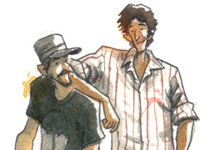 Brazil was the Guest of Honour of the Frankfurt Book Fair 2013. The Comic Zentrum in Hall 3.0 featured a few artists from Brazil. The comic book publishers from Brazil could be found in different halls. On Saturday, twin-brothers Gabriel Bá and Fábio Moon talked about their comic book Daytripper, winner of the Eisner Award 2011 and about other comics they did. They were born on June 5th 1976 in São Paulo. Since the year 2000 their comics get published in English. To name just two of them: Casanova (with writer Matt Fraction) and The Umbrella Academy (drawn by Bá, written by Gerard Way). An on-stage conversation with Stefan Pannor revealed some details about Daytripper: It is not autobiographical, they said. Unlike the character in the comic book their father is not a writer, the dog on the cover was their sister’s, and so on. There is one thing they hate to draw: horses. They don’t like to talk about who did which part of the book. For them it’s much more important to reach the readers, to disappear behind the story. The reader should concentrate on the story and not think about the author and the writer.
Brazil was the Guest of Honour of the Frankfurt Book Fair 2013. The Comic Zentrum in Hall 3.0 featured a few artists from Brazil. The comic book publishers from Brazil could be found in different halls. On Saturday, twin-brothers Gabriel Bá and Fábio Moon talked about their comic book Daytripper, winner of the Eisner Award 2011 and about other comics they did. They were born on June 5th 1976 in São Paulo. Since the year 2000 their comics get published in English. To name just two of them: Casanova (with writer Matt Fraction) and The Umbrella Academy (drawn by Bá, written by Gerard Way). An on-stage conversation with Stefan Pannor revealed some details about Daytripper: It is not autobiographical, they said. Unlike the character in the comic book their father is not a writer, the dog on the cover was their sister’s, and so on. There is one thing they hate to draw: horses. They don’t like to talk about who did which part of the book. For them it’s much more important to reach the readers, to disappear behind the story. The reader should concentrate on the story and not think about the author and the writer.
I met Gabriel Bá and Fabio Moon, with the kind support of Panini Comics, on the Book Fair. They were not drinking coffee this time, but they did on stage earlier that day, when they mentioned something about coffee and their attitude towards life, that can also be found in Daytripper: „It tastes good, it tastes hot and strong. That’s what we want out of life.“
[Hier geht’s zur deutschen Version!]
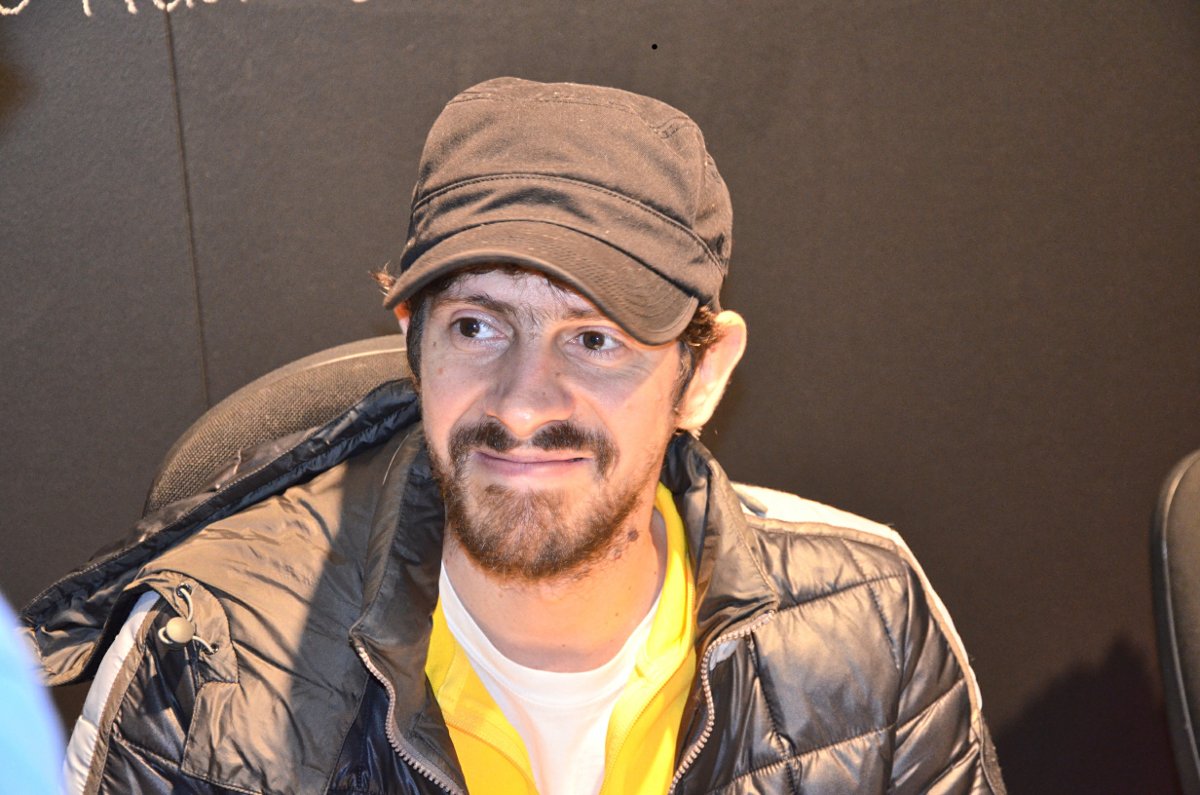 Comicgate: You are in Germany for a couple of days now. Have you noticed any differences between Brazil and Germany, for example how people behave and concerning the comic book scene?
Comicgate: You are in Germany for a couple of days now. Have you noticed any differences between Brazil and Germany, for example how people behave and concerning the comic book scene?
Fabio Moon: I think it’s the same as in the USA. The readers are very similar. The books they know, the questions they ask, the characters they like. That is similar.
It’s similar in Brazil, the USA and in Germany?
FB: It’s the same kind of reader. The German and the Brazilian market is small. When we went to France they know a lot more, than just the American comics. The audience there was much different. So, Brazil and Germany are very similar, but in Brazil we have a much longer career. There are much more books that have been published just there.
Gabriel Bá: And in Brazil we have a comic strip in the newspaper. That one also attracts a different kind of followers.
Is the strip something like a completion to Daytripper, is it about the same subjects?
Fabio Moon: It’s different. It doesn’t have a story. It’s not with reappearing characters. It’s about today’s life, but in a more philosophical way. Animals talk and ask questions.
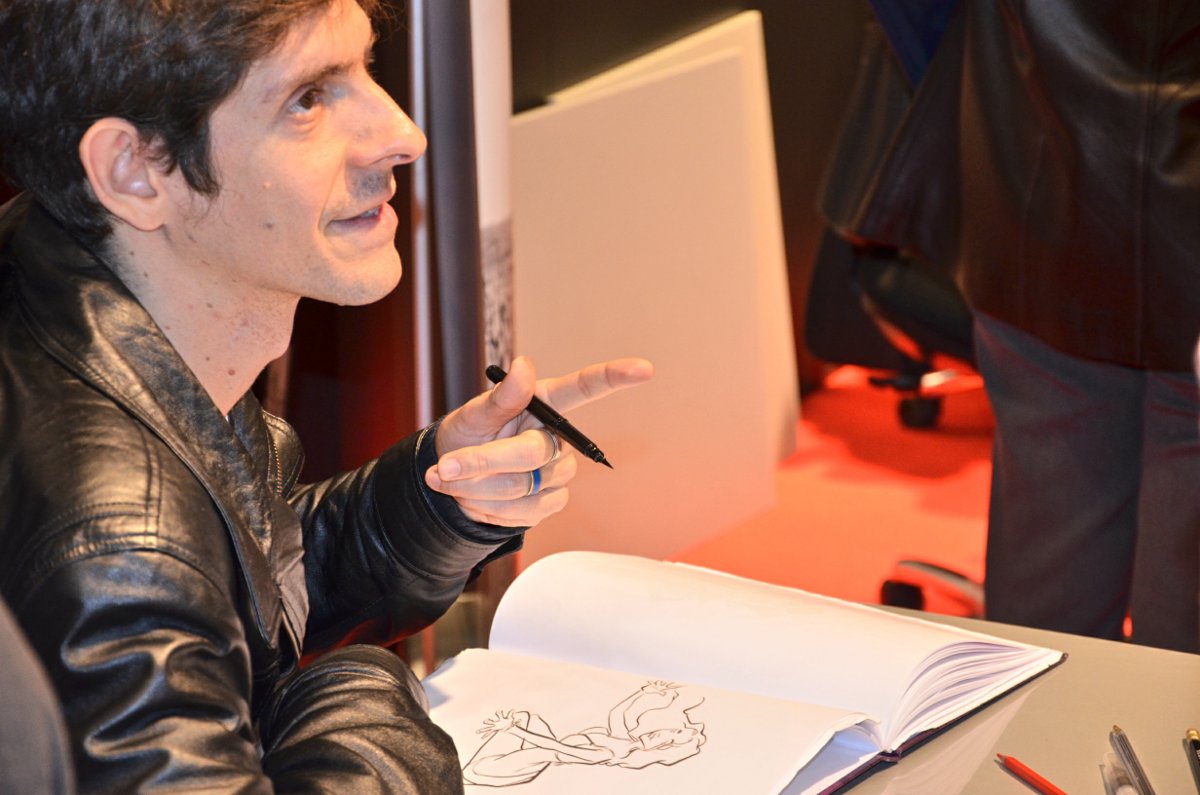 And it’s only available in Brazil?
And it’s only available in Brazil?
Both: Yes.
FB: We put it online, on our website. But it’s in Portuguese. There are people all over the world seeing it and they don’t know what it says.
During the panel today you talked about Daytripper, things like: The dog is the one of your sister, your father is not an author and so on. Does your sister draw and write as well? And your parents? Is it a thing that everybody in your family does?
Both: No.
FB: We are the only ones who do that for a living. Everyone else has a regular, normal job.
You are twin brothers, but you have different names. Probably pen names, I guess. I heard someone mentioning Bá is a famous river in Brazil – is that true?
Both (with loud voices and a bit amused): Nooo!
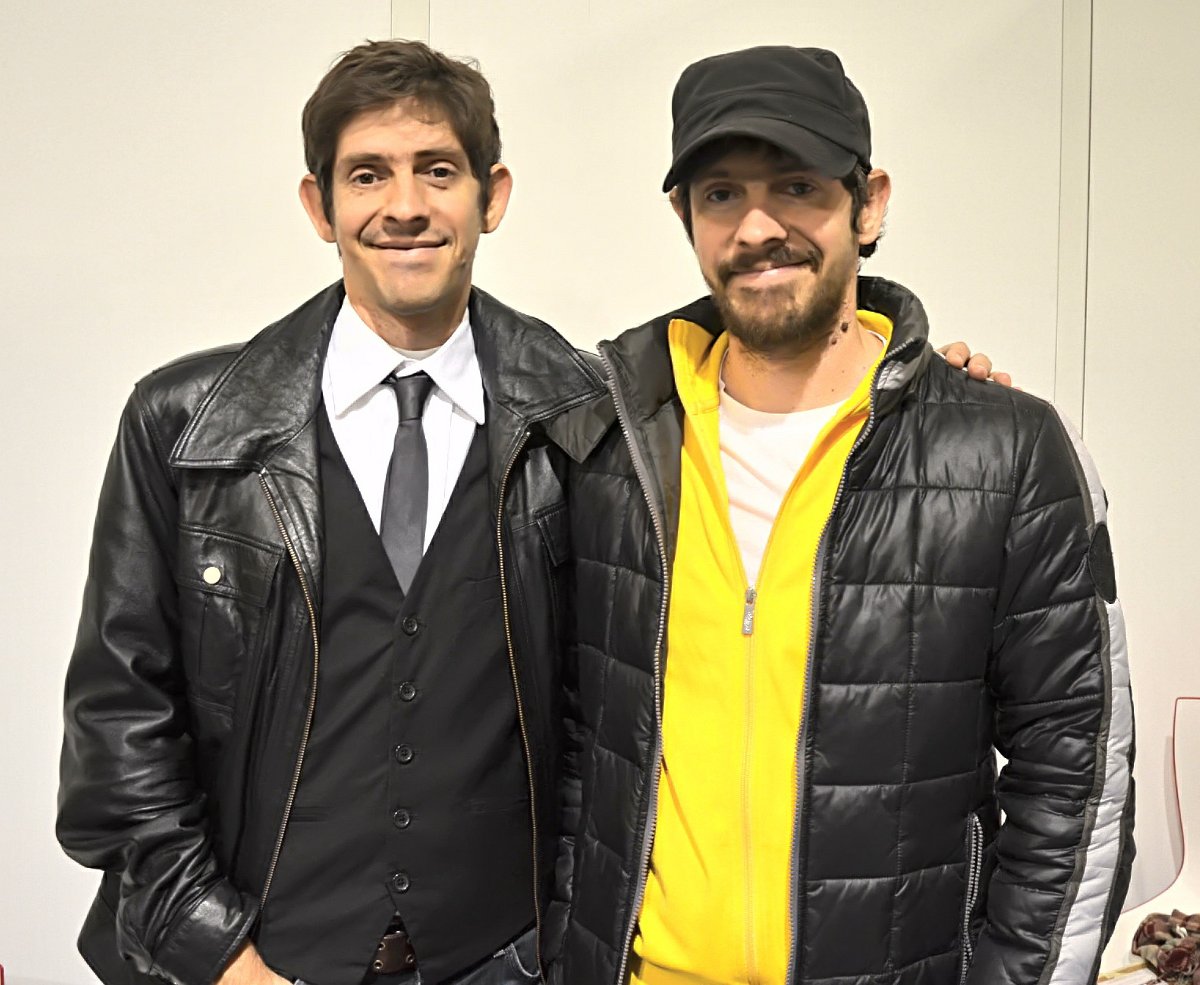 And did you pick the names because they reveal something about your personality, like a connection to nature or something like that? Or were they given to you by your parents?
And did you pick the names because they reveal something about your personality, like a connection to nature or something like that? Or were they given to you by your parents?
FM: They are more like artistic names. Bá is a nickname. It’s short for Gá. When I learned to spell letters and words, instead of calling him Gabriel, I called him Babio. People call him Gá and I call him Bá. So Bá is a nickname. Moon was a mistake, when I send mystery love letters to a girl and it was too late to go back. So now we use the nicknames as artistic names, so we don’t have trouble with the mob of girls that chases us all over the world (smiles).
One idea I had was: the names might be about the moon and the earth. Maybe that describes your characters? And there is this kind of urban myth about twin brothers, sort of a „magic“ connection between each other. You started reading and doing superheroes, like stories from the Hellboy universe. Is the twin brother thing your kind of „superpower“? Do you believe in some kind of supernatural phenomenon, like a connection to the moon? Is there more than we can see or is that just crap?
GB: Naah.
FM: I don’t think that there is a special connection. But we grew up very closely. And we spend time together all the time. So we have the same background and the same influences.
GB: Yeah. We are like an old couple.
FM: Yes. When you spend your whole life with one person you know everything about each other. How they feel, how they think, how they react. That is why we know each other so well. There is no special connection. We can work fast, because of that. Pick up very easily what the other one wants. What we want from one another. There is no other esoteric reason.
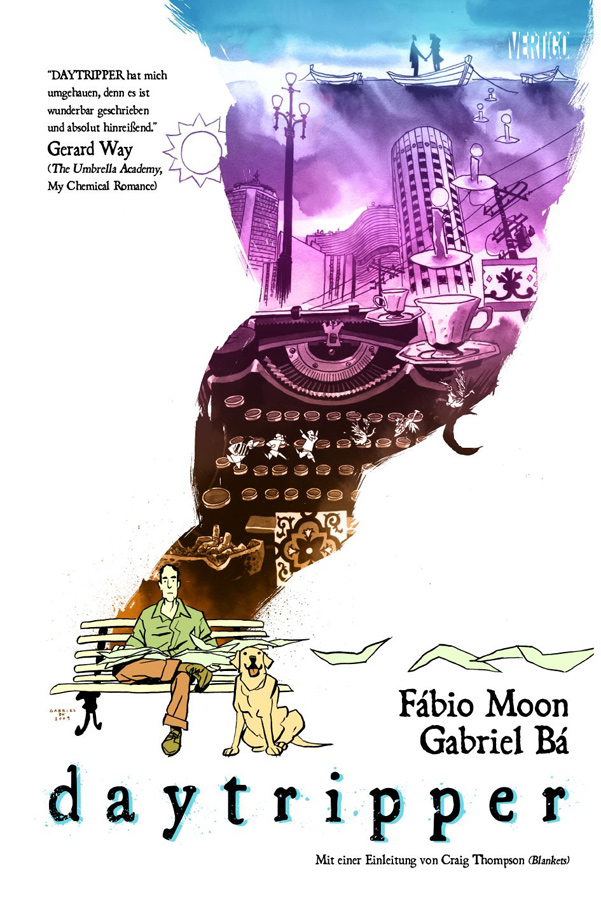 Daytripper feels very harmonic, like a strong unit of drawings and text. Very well done in my opinion. Do you think that’s because you are twin brothers?
Daytripper feels very harmonic, like a strong unit of drawings and text. Very well done in my opinion. Do you think that’s because you are twin brothers?
FM: I think the fact that we are twin brothers gives us a different perspective on how one person has an influence on the life of an other one. And how important the people you have around you really are. That gave as that notion.
GB: And also because of our working relationship. We have established very early on that we are not important. We do not matter. We don’t care who does what or who is more important as an author or an artist. That’s not important. There are many readers of the book, who don’t know anything about the authors and the artists. There is more than one author. It doesn’t matter, if you can’t make the reader dive into the story and surround him with that environment and those characters. That’s an experience that lasts longer than figuring out who did what. I think that’s what makes our working relationship better, it helps us to make a book that feels unique and not like different voices.
Do you think the readers get to know the real, authentic life of today’s Brazil from Daytripper? Or is it much more important for you to talk about family and friends and not so much about Brazil?
FM: Well, you can learn about family and people and friendship in Brazil. It’s at the same time universal, because everybody has family and friends and the problems you have to deal with in relationships, it’s also a very unique way how Brazilians relate to each other. Looking closer you see where and how it is different. And where it is unique. If we did our job right, you see it and people can relate to it, no matter where they are. I think Brazilians do relate in a very different way to each other. How they see friendship, how they see family. And their working relationships, how they deal with their dreams and anguishes. How they struggle to survive and look for a job. In the story there is a very Brazilian way to react to all these questions. But if we are good enough in our sincerity, then that story is universal.
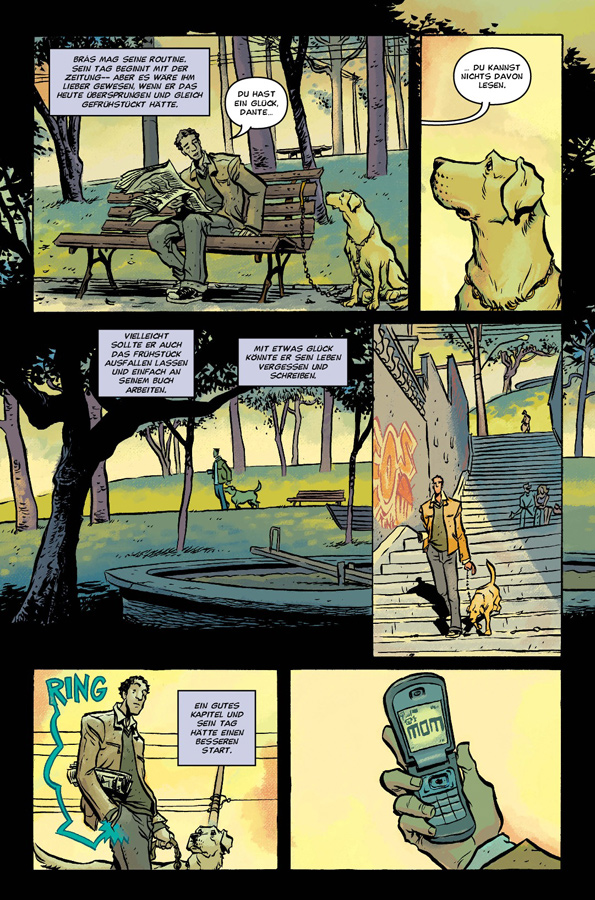 You did comics for North American publishers. Daytripper is universal, you just said. Is it difficult to sell a story about South America? Does the audience in the USA and internationally care enough about a story from Brazil?
You did comics for North American publishers. Daytripper is universal, you just said. Is it difficult to sell a story about South America? Does the audience in the USA and internationally care enough about a story from Brazil?
FM: Having the story taking place in Brazil, we could focus on what really matters. We could tell a more sincere story. So we could try to reach more sincere reactions from the audience. If we had told the story anywhere else, we could have told the same story, but we wouldn’t have the tools or the elements we were searching for, to make the story look sincere. What would happen to the characters or in the different parts of the country. The family background. We could only do that if we could let the story take place in Brazil. And that was what Vertigo wanted us to do. They didn’t want us to do a series like any other series at Vertigo. They wanted us to do the kind of story that we usually do.
You said something very important earlier today (during the interview on stage at the Book Fair): „There are many more interesting things to do in comics than using other people’s characters and tell the same kind of stories all over again.“. Is it difficult to do a comic like Daytripper? Doing Batman would be a good way to make money, but that would be less fulfilling?
FM: That’s what we want to do…
GB: Yes!
FM: It’s more difficult for us to work in superheroes, because we don’t care about the characters anymore.
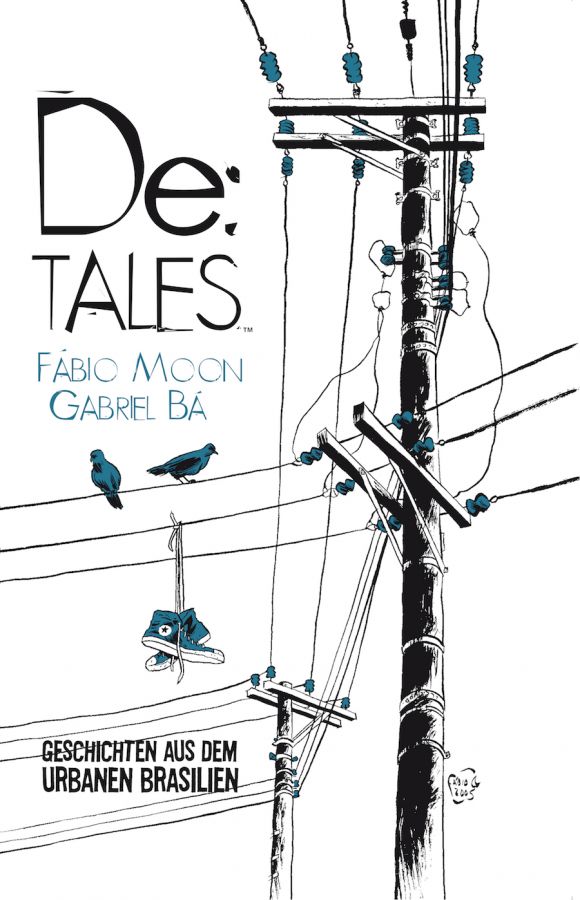 But you did when you were younger?
But you did when you were younger?
Both: Yeah.
FM: When we were younger, as readers, we loved superheroes. We have read almost all the books. We followed the stories. But now we lost touch with that. It’s always recycling and we don’t care about the characters so much anymore. Even though we love Batman, it’s no longer the Batman we liked to read. We couldn’t push us to do a good job on a Batman story for example. So we only work on projects that we care about. Even if it’s not our story. Like when we work with other writers, like when we worked with Matt Fraction on Casanova and with Gerard Way on Umbrella Academy. That were stories that had some appeal to us. And we helped to create the characters. So we cared, for the characters and for the stories. That’s the way to get the best results for a story.
GB: If we wanted to make money we would have become lawyers or doctors or stuff like that.
What kind of stories would you like to tell in your next comic books?
FM: Anything.
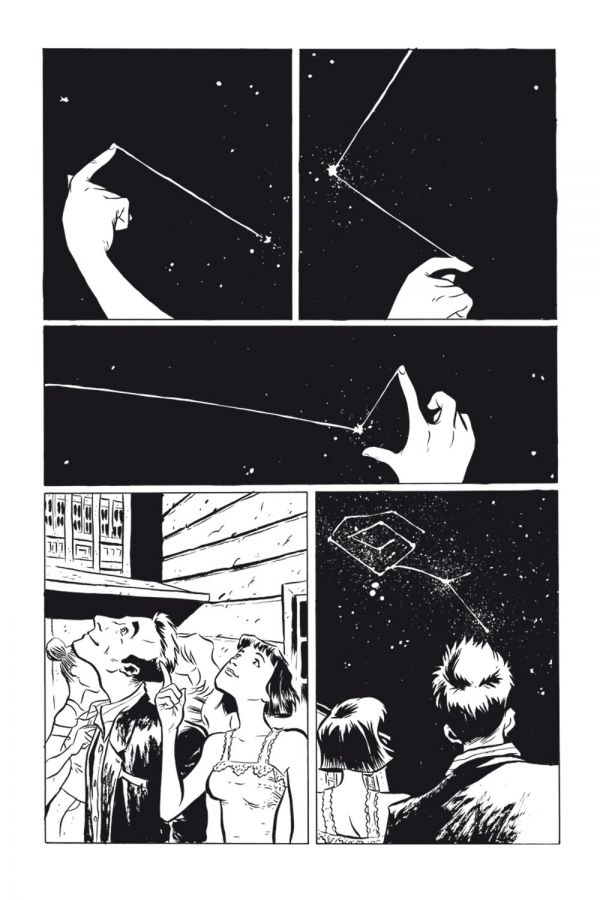 More stories about Brazil?
More stories about Brazil?
Both: No!
FM: More about relationships. The surrounding of that can be anything. We can still see a lot of possibilities to do setting the stories in Brazil. But at some times Brazil is an exotic background. Even for Brazilians! We are now doing a comic adaptation of a Brazilian novel, which takes place in Manaus, which is the capital of Amazonas state, it’s in the middle of the rainforest. For most Brazilians that’s a completely different experience. So we want to explore that. The way the surroundings influence the characters. It’s fun to draw these surroundings and fun to look at! It’s fun to see how the story develops. I want to keep doing that. I look for things that are fun to draw, because it takes a long time to finish a book.
In Mexiko there are Tijuana Bibles (very cheap kind of pornographic underground comic books) and Argentina has its own funny comic strip Mafalda. Honestly I don’t know too much about other comics from Brazil or South and Latin America in general. Is there a big comic book scene and is it disappointing that it doesn’t get more attention?
FM: The comic market in Brazil is not very big. The biggest thing that we have is Mauricio [de Sousa], that’s the one who is here at the Book Fair too. He has a career for over 50 years now. He does comics for kids and everyone learns to read by reading his comics. You can find his comics on all newsstands all over the country. It’s easy to find. Everyone knows his characters. Anything else is much smaller. Just like in Germany: 3,000 copies. You find them in book stores or in special comic book stores. It’s hard to find these comics. Most people don’t know all the possibilities that can be found in comics in Brazil. People don’t really look for Brazilian comics. That makes it even harder. So you have to go the the USA or to France, they are much bigger markets for comics. You can be published in the USA and even if your comic is a small one there, you still have a chance to get your work published everywhere else. You can be big in Brazil and still don’t reach anyone, anywhere. Very few people speak Portuguese. And they don’t know about the Brazilian market.
GB: There are a lot of comic strips in Brazilian newspapers that have been around for 30, almost 40 years. They are very famous in Brazil.
FM: But they haven’t been published anywhere else. It’s a pity.
 Final question: A couple of days ago, I met Austrian artist and writer Ulli Lust in Hanover for an interview. We also talked about Daytripper and she told me she likes the both of you very much. Do you know any favourite artists from Germany, Austria and other European countries?
Final question: A couple of days ago, I met Austrian artist and writer Ulli Lust in Hanover for an interview. We also talked about Daytripper and she told me she likes the both of you very much. Do you know any favourite artists from Germany, Austria and other European countries?
FM: We know Ulli. And we met the author of the book about the fifth Beatle. We met him at a book fair in Toronto. I forgot his name …
Arne Bellstorf.
FM: Yes, right! And we know the guy that did the book about The Boxer and about Johnny Cash. Reinhard Kleist. And we love the the French new wave of cartoonist, which are very good. We like Cyril Pedrosa. We like Frederik Peeters …
Both: … who is Swiss …
FM: And there are some Italian and Spanish artists. We like Gipi and David Rubin. But we try to look everywhere.
Thank you very much for the interview!
Images: © Fábio Moon/Gabriel Bá/Panini Comics/CrossCult
Photos: © Stefan Svik
